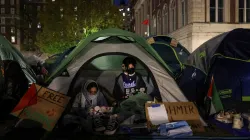US students seek full refund of tuition fees as protests against Israel intensify at several universities
With tensions at Columbia continuing to run high and some students afraid to set foot on the campus, officials said the Ivy League school will switch to hybrid learning for the rest of the semester.

Columbia: As Israel raged war against Hamas thus killing thousands of people in the already war-ravaged nation, students of several US universities have intensified their protest against Jerusalem. The demonstrating students demanded an end to civilian casualties in Gaza. The growing protests follow mass arrests of demonstrators at some East Coast universities in recent days, and show a deepening dissatisfaction in the United States, historically Israel's most important ally, with the course of the war with Hamas.
VIDEO: Students stage protest against Israel in US

New York police arrested more than 120 protesters at New York University on Monday and more than 100 at Columbia University last week. Columbia cancelled in-person classes at its Upper Manhattan campus on Monday in a bid to defuse tensions. On Tuesday, Columbia said classes for the rest of the year would be hybrid, with students able to attend online or in person.
Later, the university's president said it was time “to move forward with a plan to dismantle” the pro-Palestine encampment, and gave organizers a midnight deadline to do so.
Anti-Israel protests in US colleges
Since the war in Gaza began, colleges and universities have struggled to balance safety with free speech rights. Many long tolerated protests but are now doling out more heavy-handed discipline.
Harvard University in Massachusetts has tried to stay a step ahead of protests by locking most gates into its famed Harvard Yard and limiting access to those with school identification. The school has also posted signs that warn against setting up tents or tables on campus without permission.
Literature Ph.D. student Christian Deleon said he understood why the Harvard administration may be trying to avoid protests but said there still has to be a place for students to express what they think.
“We should all be able to use these kinds of spaces to protest, to make our voices heard,” he said.
Columbia has a history of protest
It is worth recalling that Columbia has a history of protest, most notably in 1968, when hundreds of students angry about racism and the Vietnam War occupied five campus buildings. After a week, a thousand police officers swept in and cleared them out, making 700 arrests.
However, this time, campus protests began after Hamas’ deadly attack on southern Israel, when militants killed about 1,200 people, most of them civilians, and took roughly 250 hostages. During the ensuing war, Israel has killed more than 34,000 Palestinians in the Gaza Strip, according to the local health ministry, which doesn’t distinguish between combatants and noncombatants but says at least two-thirds of the dead are children and women.
"Students across an array of communities have conveyed fears for their safety, and we have announced additional actions we are taking to address security concerns. There is a terrible conflict raging in the Middle East with devastating human consequences. To de-escalate the rancour and give us all a chance to consider the next steps, I am announcing that all classes will be held virtually on Monday," the Columbia University president said in a statement.
(With inputs from agencies)
Also Read: Israeli military intelligence head resigns, says 'failed to avert October 7 attack by Hamas'
